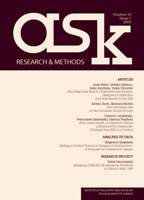How Does Length of Fieldwork Period Influence Non-Response? Findings from ESS 2 in Poland
How Does Length of Fieldwork Period Influence Non-Response? Findings from ESS 2 in Poland
Author(s): Dariusz Przybysz, Paweł B. Sztabiński, Franciszek SztabińskiSubject(s): Social Sciences
Published by: Instytut Filozofii i Socjologii Polskiej Akademii Nauk
Keywords: non-response; fieldwork; European Social Survey
Summary/Abstract: In this paper we show how one method of increasing the response rate, i.e. an extension of the fieldwork period, influences the structure of non-response and the differences between respondents and non respondents. We used data from the Pilot Study and the Main Study for the European Social Survey, Round 2, and from follow-up studies conducted after each of those. The fieldwork period of the Pilot Study was 11 days and the one of the Main Study was nearly 2.5 months. The follow-up study involved distributing a mail questionnaire to people who did not participate in the face-to-face survey (non-respondents). Extension of the fieldwork period brought a relatively modest increase in the response rate. However, a comparison of differences between the respondents and non respondents for a short and a long fieldwork period demonstrated that those differences occurred in demographic variables and in opinion questions. We also compared the effect of the length of fieldwork period on differences between the respondents and two categories of non respondents: refusers and inaccessibles for other reasons. We did not find any effect of the length of the fieldwork period on differences between respondents and inaccessibles for other reasons, neither in socio-demographics nor in opinion questions. However, the effect did occur when we compared respondents and refusers.
Journal: ASK. Research & Methods
- Issue Year: 2009
- Issue No: 18
- Page Range: 67-95
- Page Count: 29
- Language: English

